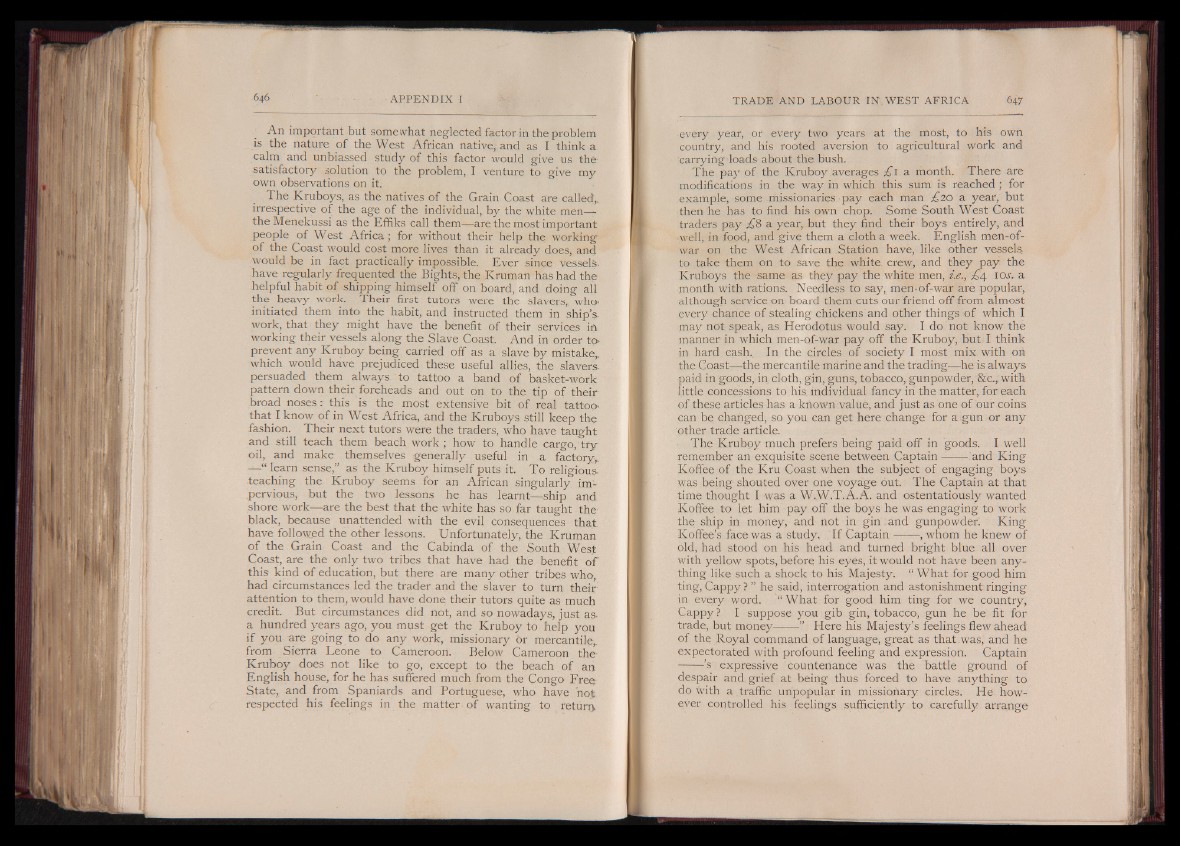
A n important but somewhat neglected factor in the problem
is the nature o f the West African native, and as I think a
calm and unbiassed study of this factor would give us the
satisfactory solution to the problem, I venture to give my
own observations on it.
The Kruboys, as the natives of the Grain Coast are called;,,
irrespective o f the age of the individual, by the white men—
the Menekussi as the Effiks call them— are the most important
people o f West A fr ic a ; for without their help the working
o f the Coast would cost more lives than it already does, and
would be in fact practically impossible. Ever since vessels,
have regularly frequented the Bights, the Kruman has had the
helpful habit o f shipping himself off on board, and doing all
the heavy work. Their first tutors were the slavers,, who-
initiated them into the habit, and instructed them in ship’s-
work, that they might have the benefit of their services in
working their vessels along the Slave Coast. And in order to-
prevent any Kruboy being carried off as a slave by mistake,,
which would have prejudiced these useful allies, the slavers-
persuaded them always, to tattoo a band of basket-work
pattern down their foreheads and out on to the tip of their
broad noses: this is the most extensive bit o f real tattoo-
that I know o f in West Africa, and the Xruboys still keep the
fashion. Their next tutors were the traders, who have taught
and still teach them beach work; how to handle cargo, try-
on, and make themselves generally useful in a factory,.
— 1 learn sense,” as the Kruboy himself puts it. To religious-
teaching the Kruboy seems for an African singularly impervious,
but the two lessons he has learnt— -ship and
shore work— are the best that the white has so far taught the
black, because unattended with the evil consequences that
have followed the other lessons. Unfortunately, the Kruman
o f the Grain Coast and the Cabinda o f the South West
Coast, are the only two tribes that have had the benefit o f
this kind o f education, but there are many other tribes who,
had circumstances led the trader and the slaver to turn their
attention to them, would have done their tutors quite as much
credit. But circumstances did not, and so nowadays, just as
a hundred years ago, you must get the Kruboy to help you
i f you are going to do any work, missionary or mercantile,
from Sierra Leone to Cameroon. Below Cameroon the-
Kruboy does not like to go, except to the beach of an
English house, for he has suffered much from the Congo Free-
State, and from Spaniards and Portuguese, who have not
respected his feelings in the matter o f wanting to return
every year, or every two years at the most, to his own
country, and his rooted aversion to agricultural work and
carrying'loads about the bush.
The pay of the Kruboy averages A l a month. There are
modifications in the way in which this sum is reached ; for
example, some-missionaries pay each man £20 a year, but
then he has to find his own chop. Some South West Coast
traders pay ^8 a year, but they find their boys entirely, and
well, in food, and give them a cloth a week. English men-of-
war on the West African Station have, like other vessels.,
to take them on to save the white, crew, and they pay the
Kruboys the same as they pay the white men, i.e., £\ ias\ a
month with rations. Needless to say, men-of-war are popular,
although service on board them cuts our friend off from almost
every chance of stealing chickens and other things o f which I
may not speak, as Herodotus would say. I do not know the
manner in which men-qf-war pay off the Kruboy, but I think
in hard cash. In the circles o f society I most mix with oh
the Coast— the mercantile marine and the trading— he is always
paid in goods, in cloth, gin, guns, tobacco, gunpowder, &c., with
little concessions to his individual fancy in the matter, for each
of these articles has a known value, and just as one of our coins
can be changed, so you can get here change for a gun or any
other trade article.
The Kruboy much prefers being paid off in goods. I well
remember an exquisite scene between Captain and King
Koffee.of the Kru Coast when the subject of engaging boys
was being shouted over one voyage out. The Captain at that
time thought I was a W.W.T.A.A. and ostentatiously wanted
Koffee to let him pay off the boys he was engaging to work
the ship in money, and not in gin and gunpowder King
Koffee’s face was a study. If Captain — — , whom he knew of
bid, had stood on his head and turned bright blue all over
with yellow spots, before his eyes, it would not have been anything
like such a shock to his Majesty. “ What for good him
ting, Cappy ? ” he said, interrogation and astonishment ringing
in every word. “ W’hat for good him ting for we country,
Cappy ? I suppose you gib gin, tobacco, gun he be fit for
trade, but money ” Here his Majesty’s feelings flew ahead
of the Royal command of language, great as that .was, and he
expectorated with profound feeling and expression. Captain
’s expressive Countenance was the battle ground o f
despair and, grief at being thus forced to have anything to
do with a traffic unpopular in missionary circles. He however
controlled his feelings sufficiently to carefully arrange